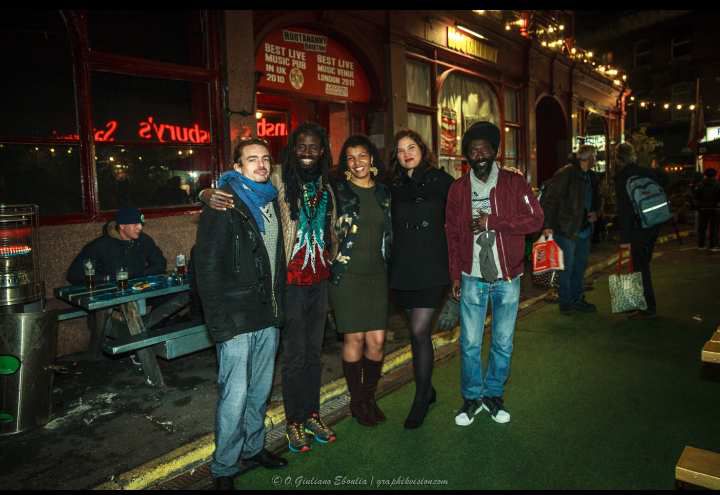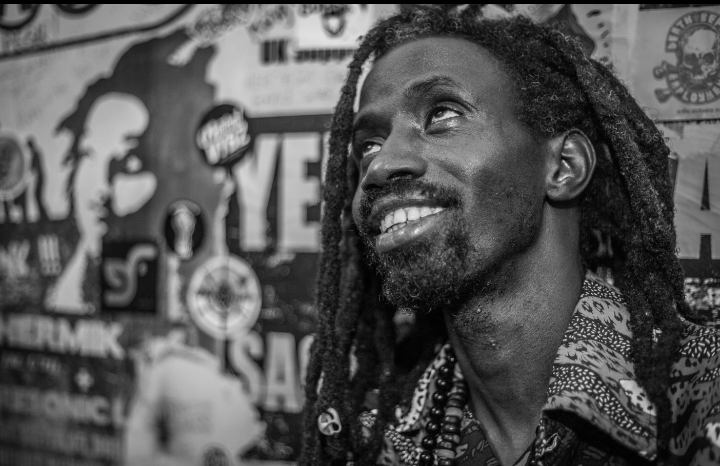burkinafaso
Mamadou Diabaté, balafoniste burkinabé
Mamadou Diabate, né en 1973 au Burkina Faso, est le descendant d'une famille de musiciens Sambla. À l'âge de huit ans, il commence sa formation auprès de balafonistes connus de peuples voisins et remportera son premier prix en 1988 dans le groupe de son père. Depuis ses débuts, Mamadou Diabaté a publié 13 CDs avec ses propres compositions et 2 autres avec de la musique authentique des peuples Sambla et Tusia (tous deux en première mondiale). En 2016, il est fait chevalier de l'ordre national du Burkina Faso et reçoit en 2019, le prix du «Meilleur artiste international» du Burkina Faso.
Mamadou commence sa carrière dès son plus jeune âge, à cinq ans lorsqu'il reçoit des leçons de musique de son père, Penegue Diabate. Son père était un joueur de balafon célèbre, bien au-delà des frontières de la culture Sambla. Mamadou Diabaté persévère dans l'apprentissage du balafon durant son adolescence et remporte le premier prix de la Semaine nationale de la culture (SNC) au Burkina Faso dans le groupe de son père. En 1998, il remporte également le premier prix de la Semaine nationale de la culture (SNC) au Burkina Faso mais cette fois-ci, avec son propre groupe Landaya.
En 2000, il s'installe à Vienne, en Autriche, où il vit jusqu'à maintenant, et fonde en 2006 le groupe "Percussion Mania" avec lequel il tourne et joue à l'international.
En 2011, il remporte le World Music Award autrichien avec son groupe "Percussion Mania" et en 2012, le Grand Prix du "Triangle du Balafon" à Sikasso au Mali. Pour son jeu de balafon, il reçoit également le «Prix Alkaly Camara de la virtuosité».
Dans le cadre de sa vie personnelle, Mamadou Diabaté estime qu'il est important de pouvoir contribuer à l'essor de son pays natal le Burkina Faso et il y a construit une école primaire où les enfants pauvres reçoivent un enseignement gratuit.
Pour en découvrir plus sur l'histoire du Balafon et de la culture Sambla, ainsi que sur le parcours de Mamadou Diabaté, cliquez sur l'interview ci-dessous réalisée au Jazz Café, à Londres, lors de son dernier passage.
Serge Aimé Coulibaly, un artiste burkinabé engagé
Serge Aimé Coulibaly est né à Bobo Dioulasso le 12 mars 1972. Depuis 2002, il travaille en Europe et dans le monde entier par le biais de la compagnie de danse Faso Danse Théâtre, dont il est le fondateur et directeur artistique . Il fondera également ANKATA, un laboratoire de recherche, création et production des arts de la scène situé à Bobo Dioulasso.
Serge Aimé Coulibaly fait ses débuts au sein de la compagnie Feeren au Burkina Faso, sous la direction d'Amadou Bourou, en tant que comédien, danseur et musicien. Cette première expérience lui permettra de partir en tournée en Afrique et en Europe. En 1998, il est choisi pour chorégraphier le spectacle d’ouverture de la Coupe d'Afrique des Nations, et en 1999 celle de l'ouverture du Festival panafricain du cinéma et de la télévision de Ouagadougou (FESPACO).
Depuis la création de sa compagnie Faso Danse en 2002, Serge Aimé travaille sur des thèmes complexes et tente de donner une véritable impulsion positive aux jeunes générations Son africanité est la source de son inspiration et avec son art, il veut créer une danse contemporaine puissante qui part du sentiment mais qui porte aussi réflexion et espoir. La puissance de son expressivité rend son travail universel et compréhensible sur tous les continents. Les pièces en date, produites sur différentes scènes européennes et africaines (festivals), en commençant par la plus récente sont Kirina (2018), Kalakuta Republik (2016), Nuit Blanche à Ouagadougou (2014), Fadjiri (2013), Khokuma 7° Sud (2011), Babemba (2008), Solitude d'un Homme Intègre (2007), A Benguer (2006), Minimini (2002).
Cliquez ci-dessous pour l'interview complet de Serge Aimé Coulibaly sur son parcours et son engagement politique lors de la 100ème représentation de sa pièce Kalakuta Republik, au Barbican Center, à Londres.
Kalakuta Republik: A place where freedom lives on !!
Provoking and non-conformist, Serge Aimé Coulibaly is transporting us in a world where Fela Kuti, the revolutionary icon that inspired the piece Kalakuta Republik, is displayed in 3D through his musical greatness, his murky and superstitious genius, his enduring creativity pushing off boundaries and his unwavering defiance. Kalakuta Republik offers no escape to facing the crude realities of revolutionary acts : the sublime and the chaos.
Part 1 " Without a story we would go mad" peaks away from codes, from what is predictable into continuous individual movements that take us into a disjointed trance. The dancers are dressed in black and white as if presenting a manichaean view and isolated experience of the world. Yet Serge Coulibaly through his appearances on stage becomes a conductor who connects with the dancers.
In Part 2 « You always need a poet », we are firstly confronted with moral decadence and the absurd. Sexual depravity, drugs, madness punctuate the sounds of jazz-infused Afrobeat. One dancer is hurt, heavyloaded while others are intoxicated, used, hurt, abused. The colours remind us of Fela Kuti’s Shrine which was both a temple and a night club. Yet, the poignant and enduring message of hope and political resistance clearly resonates throughout the piece.
The dancers keep on marching, clenched-fists in the air. And the fight goes on !!!
Kalakuta Republik will show one more night at the Barbican on 1st June and at the Edinburgh International Festival from 8th to 11th August 2019. See links below to book your tickets now.
/https%3A%2F%2Fwww.barbican.org.uk%2Fsites%2Fdefault%2Ffiles%2Fstyles%2Flarge%2Fpublic%2Fimages%2F2019-05%2F11.jpg%3Fitok%3D1LWLypKW)
Dizzying movement, revolutionary ideas and the sounds of jazz-infused Afrobeat recreate the Kalakuta Republik, Fela Kuti's communal compound in Lagos.
https://www.barbican.org.uk/whats-on/2019/event/serge-aime-coulibaly-kalakuta-republik
/https%3A%2F%2Fd31nw34ytcuxct.cloudfront.net%2Fimager%2Fs3-eu-west-1_amazonaws_com%2Fws-eif%2Fproduction%2Fassets%2Fheaderimages%2F2019-events%2FKalakuta-Republik--Doune-photo_bbeceacd03eed3f375c15829788520a3.jpg)
Kalakuta Republik | Edinburgh International Festival
A dizzying fusion of dance, music and revolution, inspired by the supercharged music and scandalous life of Fela Kuti from Faso Danse Théâtre. 8-11 August 2019.
Boubacar Kafando and Zaama Nooma at Hootananny, Brixton
Boubacar Kafando interviewed by Caro Sika
The actual band came together in 2010. The meaning of the band's name is "united we are stronger" in the Mossi Language, which is the dominant language of Burkina Faso, which counts approximately 70 languages and makes it a multicultural country, as many African nations. Boubacar Kafando and the band's love for people and unity really translate in their love for music; and the expression of their music is to call people to leave in harmony and love each other. They equally address the need for social justice and inequalities or injustice they see around them. It naturally makes perfect sense that the latest album of Boubacar Kafando, released in 2016, is called "faut pas se diviser", we must not be divided.
For more info about Zaama Nooma, Afrobeat band, check the link below:
/https%3A%2F%2Fstatic.wixstatic.com%2Fmedia%2F8cad07_ba0b1994a712417b864d49c3c2e68c97~mv2.jpg)
Boubacar Kafando & Zaama Nooma Band | Biographie | boubacarkafando
Boubacar KAFANDO, virtuose du N'goni et de la Kora, artiste compositeur interprète et leader du groupe Zaama Nooma Band...
Their musical project is, however, far beyond the music industry alone. Zaama Nooma is also the name of the charitable organisation Boubacar Kafando founded in 2007 with the aim to pass on the musical heritage of Burkina Faso and sub-Saharan Africa to the youth. It accomplishes its goal through different actions such as musical workshops (Djembe, Kora), concerts, educational activities such as the repair and manufacture of instruments and research and preservation of endangered instruments. A cultural centre "le centre culturel Zounoogo" also opened its doors in 2009 in the town of Saponé, Burkina Faso.
For more info, https://www.boubacarkafando.com/association-zaama-nooma
It is evident that Boubacar's passion and commitment for music is integral, touring throughout the world and raising funds for the work of his charity and he is actively working at promoting the band so that they can comfortably make a living from the art and their craft. That is one of the reason Boubacar Kafando loves performing in London which he considers to be a multicultural city, very open to African Culture and music.
For my part, I have loved seeing Boubacar Kafando and the Zaama Nooma band perform. I loved the energy, the fusion of rock and the traditional rhythmic of the Kora and other traditional instruments.
For Boubacar Kafando's and the Zaama Nooma's Band next concerts, find all the dates on https://www.boubacarkafando.com/
It is evident that Boubacar's passion and commitment for music is integral, touring throughout the world and raising funds for the work of his charity and he is actively working at promoting the band so that they can comfortably make a living from the art and their craft. That is one of the reason Boubacar Kafando loves performing in London which he considers to be a multicultural city, very open to African Culture and music.
For my part, I have loved seeing Boubacar Kafando and the Zaama Nooma band perform. I loved the energy, the fusion of rock and the traditional rhythmic of the Kora and other traditional instruments.
For Boubacar Kafando's and the Zaama Nooma's Band next concerts, find all the dates on https://www.boubacarkafando.com/

/image%2F2575472%2F20180507%2Fob_0df9a9_logo-white.png)
/https%3A%2F%2Fimage.jimcdn.com%2Fapp%2Fcms%2Fimage%2Ftransf%2Fdimension%3D2100x10000%3Aformat%3Dpng%2Fpath%2Fsc698778c614904b2%2Fimage%2Fi3c76789fc012370d%2Fversion%2F1534407195%2Fimage.png)


/image%2F2785598%2F20210503%2Fob_ee3677_serge-aime-coulibaly-c-lydia-nesvadba.jpg)
/image%2F2785598%2F20210503%2Fob_642c54_received-229142025172866.jpeg)


/image%2F2785598%2F20181127%2Fob_81922f_screenshot-2018-11-27-09-41-46-1.png)
/image%2F2785598%2F20181127%2Fob_f7a64a_screenshot-2018-11-27-09-43-42-1.png)
/image%2F2785598%2F20181127%2Fob_7da7b3_screenshot-2018-11-27-09-41-03-1.png)


